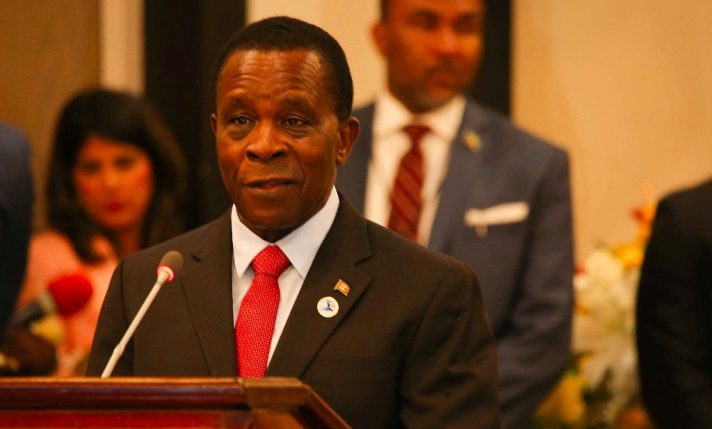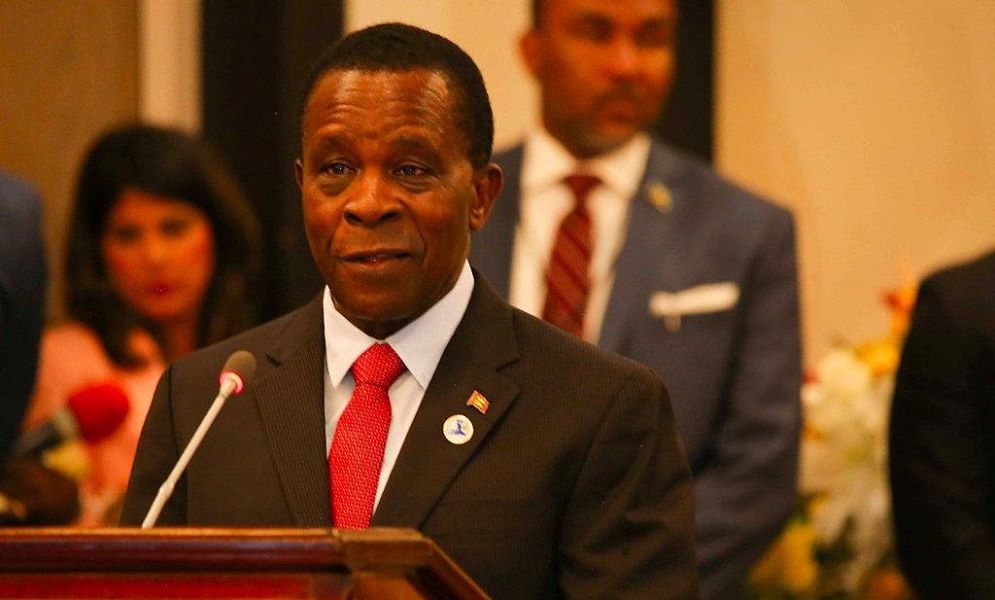The Government of Grenada is pleased that so many busy professional persons have responded to our call for help to address the crucial issue of strategic exploitation of Information and Communication Technologies (ICT) for the benefit of our peoples and the Region.
The Government is very pleased that you have taken the time and trouble to come and to add your knowledge and experience to our National effort. Your manifestation of cooperation and support is particularly heartening and it strengthens our hope for improved Regional cooperation, better networking and mutual development. As you give, so may you receive.
The Government of Grenada recognises and extends its gratitude to the Commonwealth Partnership for Technology Management – the CPTM – for its support in this germinal effort in Grenada. CPTM’s assistance has given us the confidence to move forward. Without the help from CPMT, and Dr. Mihaela Smith in particular, Grenada would not have been able to take this important step in embracing the planning for Information and Communication Technology.
We wish to urge other organs within the Commonwealth, the United Nations, the European Union and the Americas to accelerate their various initiatives and support in this field.
The Government of Grenada is convinced that ICT must be embraced as a vital tool in the next phase of Grenada’s development. This need to embrace ICT is true for Grenada as it is for the other Member States of the Organisation of Eastern Caribbean States and the other wider CARICOM states.
In my Millennium Vision delivered on December 31, 1999, the Government of Grenada acknowledged its determination to give Grenada the knowledge and the power to significantly improve the livelihood of all its citizens. In that Vision Statement, the Government proposed the acquisition and utilization of knowledge as one of the most effective ways of reducing the level of poverty in the domestic economy.
I can repeat part of what was projected in the Vision Statement:
“Government is totally committed to creating an attractive policy and regulatory environment to facilitate the development . . . of Grenada as a Knowledge Society.”
The Government also designated the new decade as the Knowledge Enhancement Decade for Grenada and set out a series of specific objectives to be achieved within the ten-year period.
One of these objectives I can quote for the consideration of this Dialogue is as follows:
“At least fifty percent of our human resources (must be) engaged in high-value knowledge-based activities, including information and communication technology, financial services, education, agriculture, tourism, sport and entertainment.”
The Government of Grenada recognises that the development of a knowledge economy requires the intensification and deepening of the domestic capability for acquisition and utilization of knowledge in all sectors of the economy, including the traditional sectors, small businesses and high-tech sectors. It involves the embracing information and communication technology and its use as a development tool.
To achieve this goal, Grenada must:
Create the right policy and institutional framework and environment to encourage knowledge-centered activities
Make knowledge the center, the main resource of our new economic and management environment in the public and in the private sector, in the rural and urban areas of our Country.
Continuously develop and improve our capacity to generate as well as to seek, find and acquire knowledge by both the public and private sectors.
Promote and develop the infrastructure for the affordable access to knowledge by all sectors of the population.
Learn to effectively and efficiently utilize knowledge in all sectors of the economy, including the Government sector.
Massively and continuously train our people so as to develop our human capital across a wide range of activities.
Encourage and promote creativity and innovation at institutional and individual levels.
In this context, Information and Communication technologies become the dominant tools of the knowledge-based economy.
In Grenada, we have taken certain steps which we hope will set the base for use of ICT by all sectors of the economy:
· The infrastructure of a modern telephone system is virtually in place. Every Parish has direct access to telephone service and the statistics on the number of connections suggest that nearly every household in the Country has been connected. The matter of costs and the range of services are being addressed.
· Cellular phones are becoming commonplace among the business community and, as the price declines, we hope to see the wider use among householders.
· Cable Television is available in all the parishes in Grenada, and with 10,000 connections, represents more than one-third of all households. Moreover, the Cablevision Company, as part of its social commitment, has without cost to the Government, embarked on a programme of connecting our schools to its cable system. Close to 50 percent of the schools have already been connected. In so doing, Cablevision is linking all schools to one central location from which they can receive national broadcasts. Teachers and students can also take advantage of the many informative and educational programmes available on the network. This is a free service to our schools and it offers the potential for teaching, for knowledge acquisition and exchange via the cable system.
· Electric Power has already become universal in Grenada, although the matter of cost and prices still has to be addressed.
· It is significant to mention the initiatives in the private sector by several small computer companies who have combined sales and services with training in software utilization and hardware repair and maintenance. We also see the beginning of training in computer programming and the Government is particularly keen to encourage further development in this field.
Education
Ladies and Gentlemen, in the school system, the Government has taken the initiative to provide all our secondary schools with Computer labs and meet the cost of access to the Internet. Significant training has taken place among teachers. The Ministry of Education advises on some of the uses to which this technology is being put:
1. The preparation of students for Caribbean Examination Council Examinations in Information Technology.
2. Cross-curricular networking among local schools and some schools in North America. This has given a tremendous boost to the information sharing and acquisition capabilities of our teachers and students.
3. E-mail is becoming the major form of communication between many schools, the Ministry of Education and external entities like CXC and Cambridge.
4. A few teachers are known to be pursuing further studies through the use of the Internet in schools. Most of them are enrolled with Universities that offer degree programmes on line.
5. The integration of IT into the curriculum has also begun. To date Math, English, Spanish and Library Science have been partially integrated. The teachers of these subjects now act increasingly as guides and not merely as teachers once they do the lessons through the computers.
6. Schools are now using their WebPages to post information that is pertinent to the public. For example, www.mdc.edu.gd (McDonald College) will give you even the latest points standing among the competing houses, etc. The systems are also used for staff development activities. A number of teachers were taught to use the computers for making PowerPoint presentations etc.
7. Many teachers are using the Web for lesson development and presentation.
8 Some teachers use the Internet to post their assignments to the students. The students’ work is usually in the form of hard copy since few of them have access to computers once they are away from school.
These may not be very revolutionary compared to programmes in more advanced societies; but they show that the initiative of wiring the secondary schools is beginning to bear fruit. Clearly significant widening and deepening will be required.
The Public Sector: Modernising Government
The role of Government is a dominant factor in the Grenada economy. The Government of Grenada accounts for a significant part of the working population. It is a major contractor for goods and services and a provider of infrastructure that facilitates the flow of services and information. The Government also finds itself taking up the slack or pursuing initiatives wherever the private sector lacks capability or the critical mass or the maturity to favourably transform the operating environment..
Modernizing the Grenada economy therefore inevitably means modernizing Government.
Most of the considerations about the use of ICT in industry or in the private sector also apply to Government. In addition, Government is a prime technology demonstrator and may have to lead by example. This leadership role imposes a burden on the Government to be in the forefront of ICT utilization in Grenada. The costs of early adoption and application of ICT’s have to be weighed, among other things, against benefits that come through the demonstration effect to the rest of the economy.
Some of the main aims of modernizing Government must include some of the following:
Making it easier for businesses and individuals to deal with Government.
Enabling the Government to offer services and information through the new media of the Internet or later through interactive TV.
Improving communications between different parts of the Government, making it easier for different parts of the Government to work in partnerships; and reducing the need to ask people repeatedly for the same information by different service providers.
Helping the public sector to become itself a learning organisation by improving access to and organisation of information.
In considering the strategic plan for the Grenada Public Service, the Government would like to determine the direction and extent of investment for information systems within the Public Service for the coming three years.
The focus however should not be limited just to the technology. We would need to give high priority to efficiency factors, service delivery, wastage avoidance and, at the same time, ensure that there are positive returns to the investments. The aim must be the optimization of the investments in information systems.
Moreover, the policies, strategies and initiatives with respect to information systems in the Grenada Public Service must be undertaken within the process of a holistic strategy for public sector reform. Information systems and technology are therefore not the end, but are the means that enable the economic, effective and efficient attainment of the Public Service’s main mandate which is the delivery of services whether infrastructural, economic or social.
Consequently, it is imperative that the Grenada public service develops, inculcates and sustains an Information Technology culture, embracing a culture of information resource management, and the capacity for strategic management of information. The question therefore arises as to the right and appropriate institutional framework and strategic programme that would result in the inculcation of such a culture in the Public Service.
The Dialogue can address this. It is clear that the overall national responsibilities which the Government must exercise in the domestic economy impose an additional demand on the management capability of the pubic service.
However, the Office of the Prime Minister accepts that it will have to assume the functional responsibility for the regulatory and strategic direction of information systems within the Public Service. That would require the building of institutional and management capacity in that Office.
The process of developing capacities in the other parts of the public service itself requires strategic planning and managed implementation.
To this effect, a process of capacity building should be initiated as quickly as possible. Among other things, this should be supported by the undertaking of an aggressive human resource competence building initiative within the Public Service.
We would be happy to have this Dialogue point to some directions in these areas.
Private Investment
The Government of Grenada has long realized the need to encourage foreign investment as a means of diversification of the economy and of generating jobs and foreign exchange. In developing a knowledge-based economy and in the embracing of ICTs, the Government recognises the external factors of investment capital, the expertise and markets.
The trend towards globalization demands of Grenada the greater integration of its economy with that of the international community. The need to do so is inevitable. But, the strategy for doing so remains for the time being in our hands. Such a strategy must also be developed.
The Government will continue to give high priority to the attraction of foreign investment in the knowledge and information sector. The Industrial Development Corporation and related agencies would need to play the major role in this regard.
Caribbean Relevance
Before I end, let me say a brief word about the Caribbean relevance of what we undertake here.
In Grenada we have taken the initiative to develop the beginnings of an ICT Strategic Plan for the Country. The exercise that we undertake here today must deepen that initiative and embed it into the national economy. More than that, however, the Government of Grenada is of the view that the exercise must be widened to embrace initially the Eastern Caribbean in order to ensure that each of our economies secure optimum benefits from the embracing of ICTs.
Information and Communication Technologies yield their best economies and cost-effectiveness where large quantum of information and users are involved. Grenada sees major advantages in a CARICOM-wide ICT strategy and ICT development programme.
Providers of ICT infrastructure and services are invited to consider not only a national Grenada development strategy but, also, a CARICOM/Caribbean framework of expansion, service providers and industry activity. We think that there is merit here and urge our Caribbean professionals and policy makers to embrace this concept.
In conclusion, I wish to say that I have a vested interest in the outcomes of this Dialogue. I will give it my attention and time and look forward to a fruitful experience for everyone and optimal benefits for Grenada.
Thank you.





